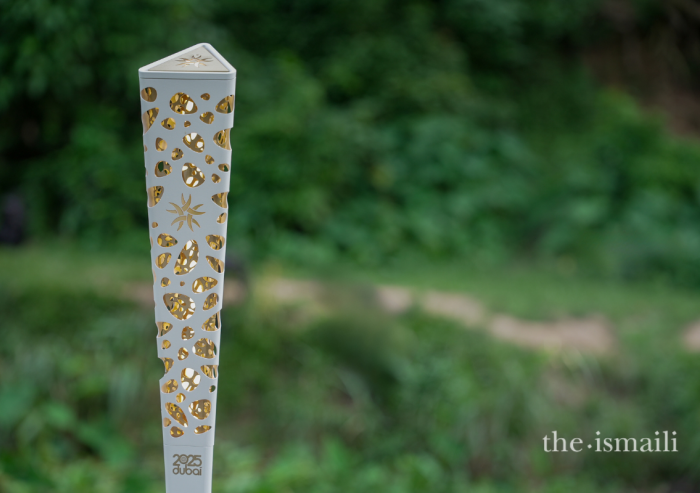Conquering public speaking
When Danish Dhamani arrived as a freshman to study Mechanical Engineering at Drexel University in the United States, he realised the need to improve his public speaking skills — a concern faced by many such students in his position, the world over.
His response was to develop Orai, a mobile app aimed at improving public speaking skills, drawing on Artificial Intelligence, engineering and algorithms. The innovative app tracks ‘filler’ words, assesses tone of speech, and generates a report with suggestions in order to become a better presenter.
Before moving to the United States, Danish had graduated from the Aga Khan Academy in Mombasa. Students at the Academies develop an understanding of both global and local issues, and are encouraged to use critical thinking skills and creativity to find innovative solutions to modern challenges.
Reflecting fondly on his time in Mombasa, Danish recalls, “the Academy and the IB programme encouraged me to be a global citizen; someone who develops and uses knowledge to solve global problems. I think this is one of the reasons I chose to create a public speaking app.”
“Public speaking is one of the most realised fears in the world —more so than sharks and spiders! But it is a fear that can be overcome - and when conquered - a skill that can give you confidence, open doors and potentially change your life for the better.”
For their tireless efforts and dedication, Danish and his co-founder have received numerous accolades, drawn plenty of media attention and raised funding from investors. Having graduated with a degree in Mechanical Engineering, Danish is now working full-time on Orai, which counts over 30,000 smartphone owners among its user base around the world.
Despite the rapid growth and success at this young age, Danish remains grounded and humble: “Every time I excitedly tell my mom about new developments in our app, she always reminds me to be thankful.”
Danish also reminds us of the risks the new technology brings to our lives, saying, “With rapidly advancing technology and pressures of modern life we think it is acceptable to do things that everyone else might be doing. However if you introspect, they may go against our principles. So we really have to be very aware and mindful of our actions.”
Translating ethics into action
“New Dimensions,” an exhibition created for the Jubilee Games in 2016 as a conduit to showcase the work of the AKDN was an impressive feat. “The team that carried out the exhibit did a fantastic job of curating it - from the colors of the lights to the information it relayed,” recounts Naveed Jooma, from the United States.
Behind this effort was a team that had been hard at work, gathering content by scouring hundreds, perhaps thousands of photos, videos, and interviews of the impact that AKDN has created the world over. Naveed was asked to help build the mobile app to accompany the exhibition. The idea was simple – a means to share stories with everyone, not just those who were present in Dubai for the games.
When the Diamond Jubilee arrived, the project was revived with greater scope, and was given the name Ethics in Action (EiA) – this time, the idea was not only to convey the work of AKDN through mixed media, but also to provide additional information about AKDN to members outside of the community. As a companion to the traveling exhibit, the EiA app helped facilitate that sharing of knowledge and provided new information throughout the Jubilee year and beyond.
For Naveed, the principles of his faith help guide him in choosing which technology projects he takes up or policies he enacts. “I think the draw of a challenging problem or the glitz of a big tech company can be a little blinding, particularly in the software engineering world. The tenets of our faith — helping others, doing social good, encouraging peace and tolerance — play a large role in all my decisions about where I work and the types of projects to which I contribute.”
Nearing a crossroads as a technological society, the most important issues facing us today are those of the loss of privacy in the digital world and the unfettered use of artificial intelligence explains Naveed. “Both issues can be quite harmless — Google Maps using your location data to send you advertisements for restaurants or Netflix suggesting your next favourite show. But the nefarious intentions of a few could have very real consequences for many, so we should be conscientious of the programs we support, the data we give and collect, and the ways in which that data is used.”
For young developers and budding engineers looking to contribute to society through technology or otherwise, Naveed suggests finding a problem they are passionate about, and then asking whether that problem is worth solving, and whether technology can help.
“It’s too simplistic to think every problem should have a technical solution - that technology is a panacea. There are many challenges in the world that need addressing, some that require technology and others a bit more humanity. Find a project you’ll be proud to sign your name on, not just any problem that needs solving,” he explains.
Enhancing human connections
Ugenie was founded in 2016 as a means to let people share information and resources more efficiently.
The premise was borne from research indicating people’s generosity especially towards communities and networks they belong to or feel an affinity with. “A parent, for example, is more willing to share used children’s furniture or toys with people from their own faith community than with people they do not know. In turn, we know from our own experience within the community - sharing creates stronger community ties,” explains Susan Kabani, co-founder of Ugenie.
In order to facilitate this virtue of sharing within communities and businesses, technology paved the way to find solutions and streamline processes and ideas - the sharing of information lying at the crux of it. “When polled, the leaders of these organisations revealed that they would like to introduce technology to facilitate smarter communication, but they either did not have the time or money to do so.”
As a result, Ugenie’s first version was built as more than just a simple place to share tasks within a community, but as a more comprehensive communication solution for organisations to create affordable and relevant community hubs for the members.
“Ugenie’s main purpose is to build technology that does not replace human connection but enhance it” explains Susan.
“With the tremendous amount of information being shared with people through digital means, today's largest detriment to engagement is irrelevant information – ‘noise.’ We must all navigate this digital noise on a daily basis to find information and people that are relevant and important to us. Even though we are more connected than ever, we are disengaging from communities or brands we align with.”
On what inspired them to build for their communities, Susan explains “Both myself and my co-founder husband Fahim Kabani, are Ismaili. We have both grown up with strong ties to the community and have spent a lot of time volunteering for various community initiatives. We have learned plenty life skills and made life-long friendships within our community… We wanted to build technology that would better facilitate and foster real-world connections, not replace them.”
For those looking to build an entrepreneurial mindset, Susan reiterates the importance of a network and their communities. “Our network has been an incredible asset. Don't hesitate to reach out to people to ask for help because most times they are more than happy to aid you in some way. Further, this support will be invaluable on days when you want to give up!”
“Building a business is very hard, and takes a lot of time and energy. You need people in your corner to not only encourage you to keep going, but also when it's time to stop if that becomes necessary.”








